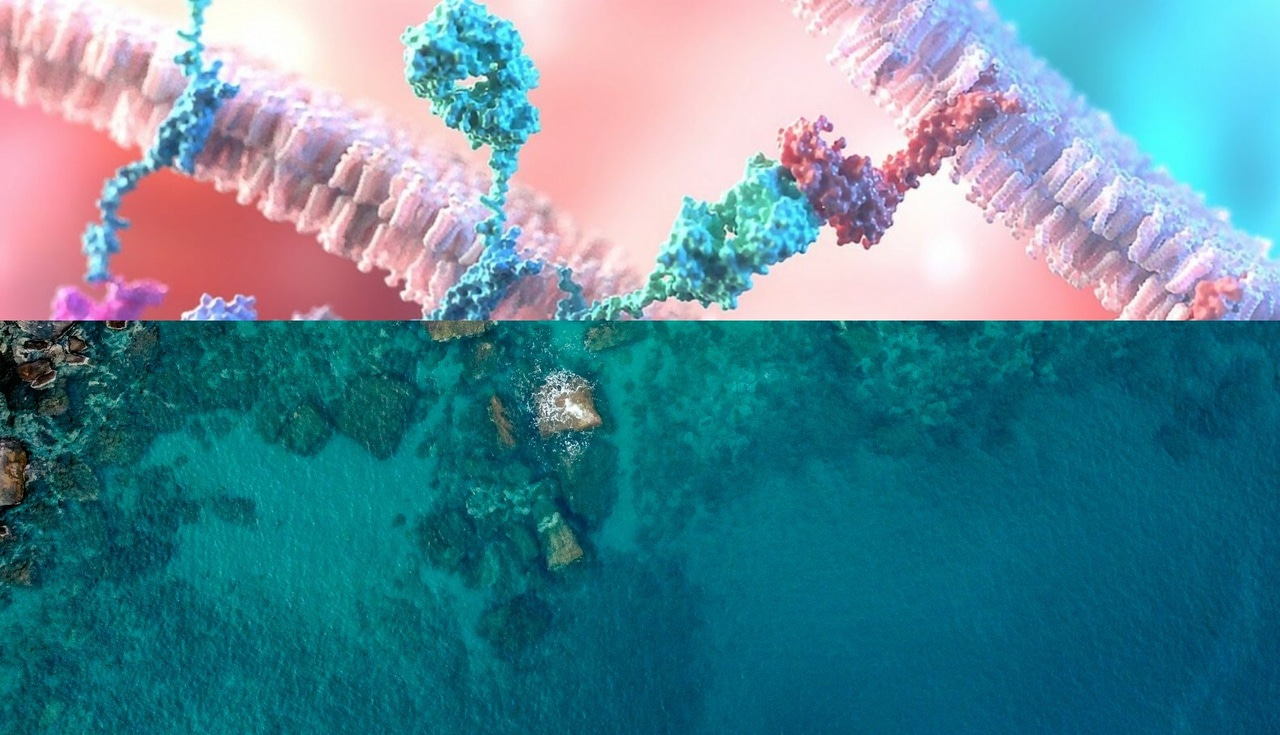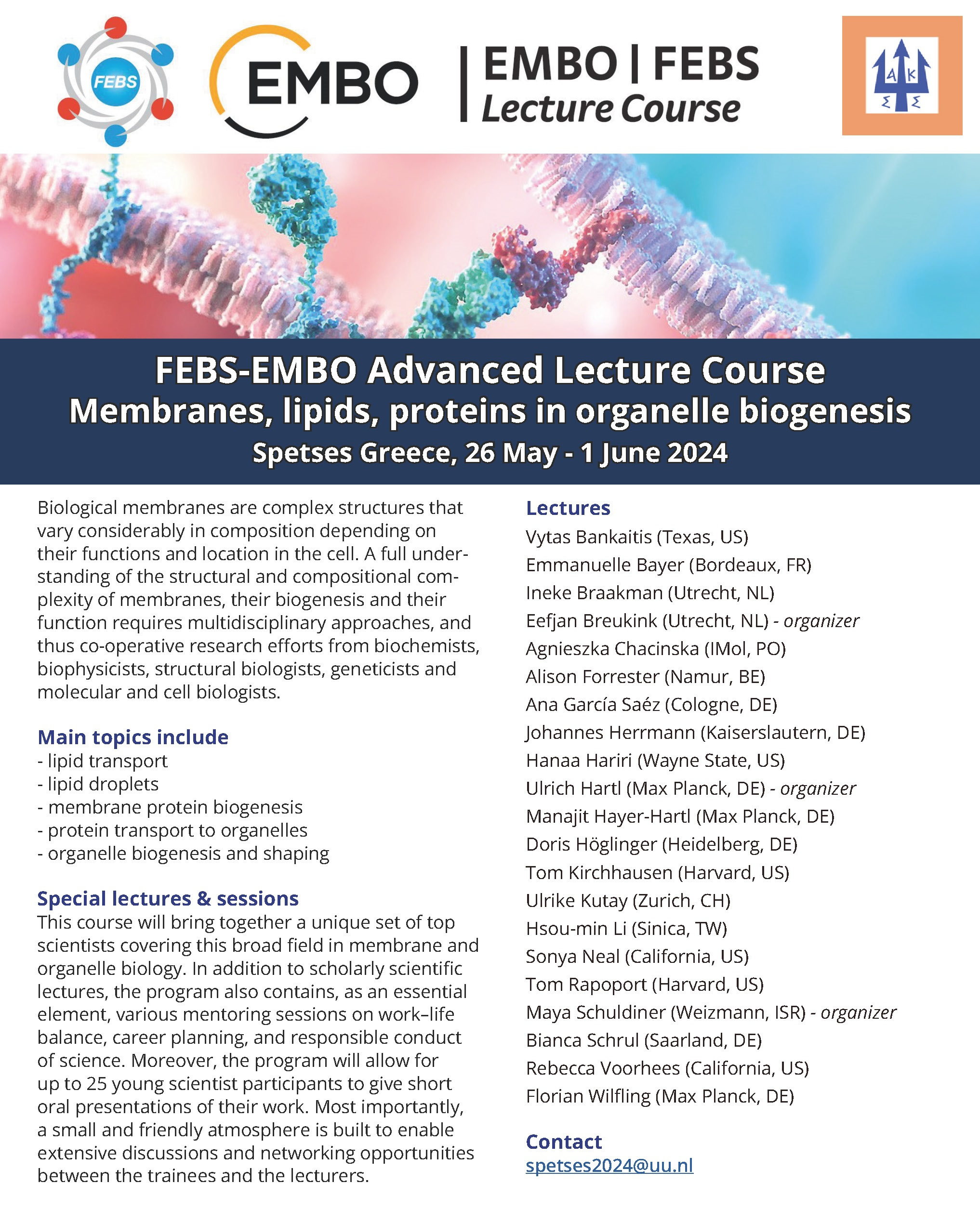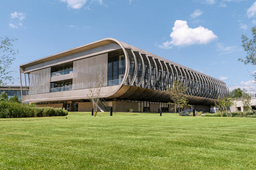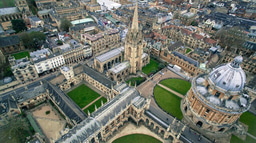Understanding biological membranes by the Greek sea

The post authors are Hanaa Hariri, PhD. Assistant professor at Wayne State University, Detroit MI, USA, and Alison Forrester, PhD. Group leader (F.R.S.-FNRS) at the University of Namur, Belgium.
As junior group leaders working in the field of membrane biology, we are excited to be attending the Joint FEBS/EMBO Advanced Lecture Course 'Membranes, lipids, and proteins in organelle biogenesis'.
Hanaa Hariri started her group at the Wayne State University, Detroit in the USA in 2021 and will lecture on membrane contact sites. Alison Forrester started her group at the University of Namur in Belgium in 2022 and her lecture will focus on COPII trafficking. This year, the course will be held on the beautiful Island of Spetses in Greece from the 26 May to the 1 June, and we can't wait for the opportunity to meet colleagues and peers from around the world.
How is this course different compared to other scientific meetings?
The FEBS/EMBO Lecture Courses are designed to provide attendees and lecturers with the opportunity to discuss their topics in the field and connect with other participants. Lectures are given by a wide variety of researchers, ranging from new PIs like us, to senior world experts.
As this conference is an advanced lecture course, lectures will give a full view of each subject, from historical to cutting-edge perspectives, allowing each topic to be presented comprehensively – in some cases by the people who had a role in discovering them.
Throughout the six days, participants and lecturers dedicate their undivided time to the course, on both the academic and social side, which means attendees benefit from immersing themselves in the field, as well as enjoying generous networking time with their peers and colleagues.
What does this course cover?
The human body is composed of around 1% carbohydrates, 15% lipids and 17% proteins. Lipids are the primary component of membranes, which act as a support for membrane proteins. They play key roles in many fundamental cellular processes including protein trafficking and sorting, cell signaling, and organelle biogenesis. Most lipids and many proteins are synthesized in the endoplasmic reticulum, then distributed to different organelles via membrane trafficking, to maintain organelle function and homeostasis.
Despite lipids accounting for such a large and active component of the body, there are still huge gaps in knowledge surrounding this field. However, with the invention and advancement of a number of technologies that allow us to study lipids, such as super-resolution fluorescence microscopy and OMICs-based analytical mass spectrometry, we are currently witnessing a renaissance in lipid biology and membrane trafficking research. Thus, this is an extremely exciting time to work in this field, providing the opportunity to use cutting-edge technologies (and potentially to be involved in their development) to be at the forefront of previously unstudied fields or even rediscover cellular phenomena we thought were already resolved.
How does the course help participants being part of a field?
As well as the course being a lot of fun, participants will benefit from learning almost everything that is currently known about membranes. Additionally, attendees will get the opportunity to meet peers who share an interest in the same topics, so this course is an easy way to expand their networks. Through exposure to peers and colleagues, some students are also able to find novel solutions, new approaches, and potential for collaborations via this course, as well as potentially finding that new post-doctoral position!
One of the reasons why we love working in this field is because it can incorporate many disciplines, such as different areas in cell biology, biochemistry, biophysics, pharmacology, and medicine. Studying problems in membrane biology requires foundational knowledge in multiple areas of science, in addition to a broad technical skillset. Therefore, being a successful scientist in the membrane biology field requires interdisciplinary discussions and collaborations.
This FEBS/EMBO Advanced Lecture Course on Membranes, lipids, and proteins in organelle biogenesis provides an unparalleled opportunity to hear world leaders discuss their topics, but it also provides the time and opportunity for personal interactions in a friendly, relaxed, and beautiful setting, and to put faces to names of people who have shaped their field. It is a great opportunity to build international and interdisciplinary networks and, importantly, it also allows us to focus on one of the most important parts of our respective careers – forging friendships that enrich and support us in our field. Having time to develop these relationships is incredibly precious and not something that we often get the opportunity to do!
It also provides the perfect environment for junior scientists to be able to discuss their work in depth with peers and experts: from the broader, philosophical picture to the everyday challenges with specific experimental approaches. It’s a great time to identify areas for collaboration in your own projects, but also an opportunity to identify people who you might be interested in working with in future research positions, which is also of great interest to the group leaders!
What will the highlights be for us?
As junior group leaders, we are incredibly excited to be involved with this course. It’s a very special opportunity for us to be able to dedicate time to putting together our lectures and immerse ourselves in the history of our field and hear about contemporary and upcoming research – being able to surround ourselves with knowledge like this can otherwise easily be deprioritized in our day-to-day lives.
We’re also looking forward to taking time to meet old friends and make new ones, both more senior and more junior than us. And this doesn’t even cover the beautiful location! This conference will be a great opportunity to pass on some of the experiences we’ve had over the past few years becoming group leaders, which is an incredible journey and one we’re excited to share with another generation of researchers. And of course, we’ll be very interested in identifying new collaborators and even potentially identifying our potential future post-docs.

Top image is a composite from the course banner image and a photo by Jim Niakaris on Unsplash.





Join the FEBS Network today
Joining the FEBS Network’s molecular life sciences community enables you to access special content on the site, present your profile, 'follow' contributors, 'comment' on and 'like' content, post your own content, and set up a tailored email digest for updates.